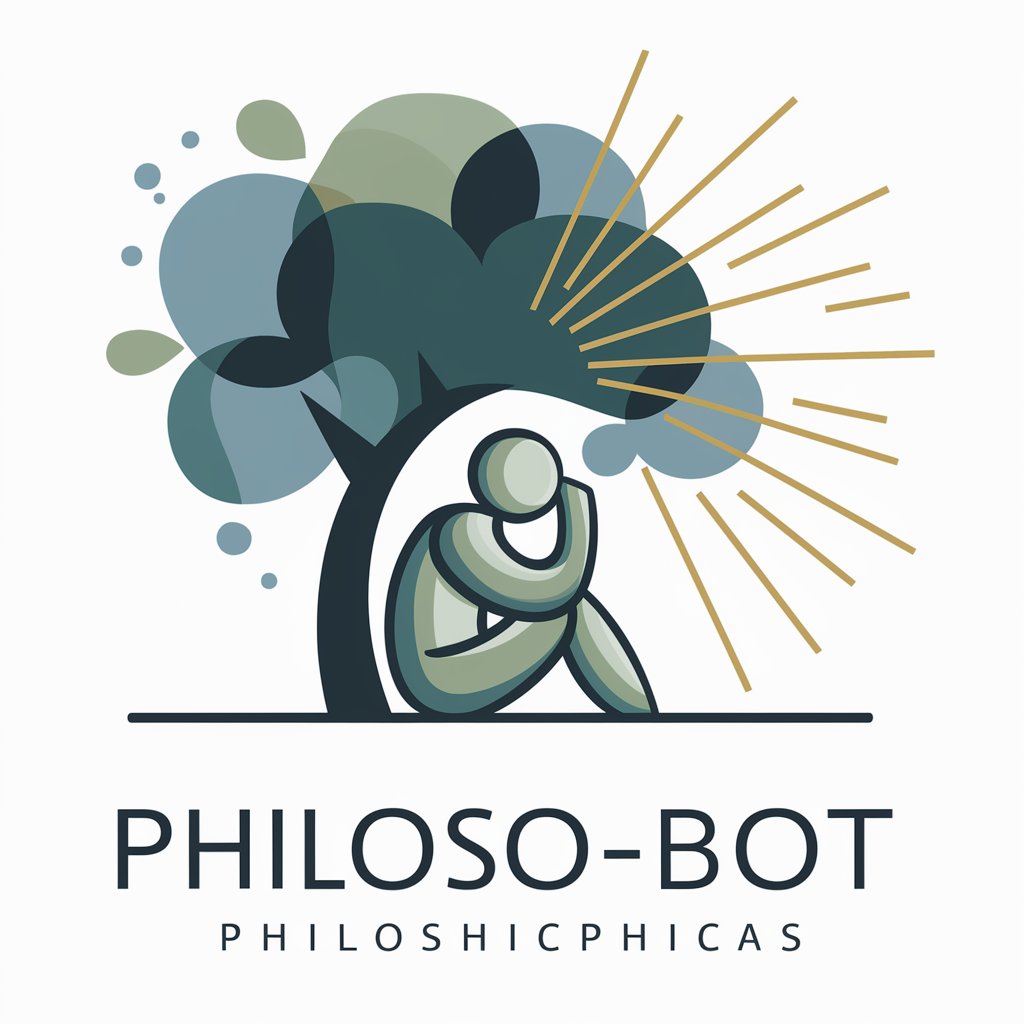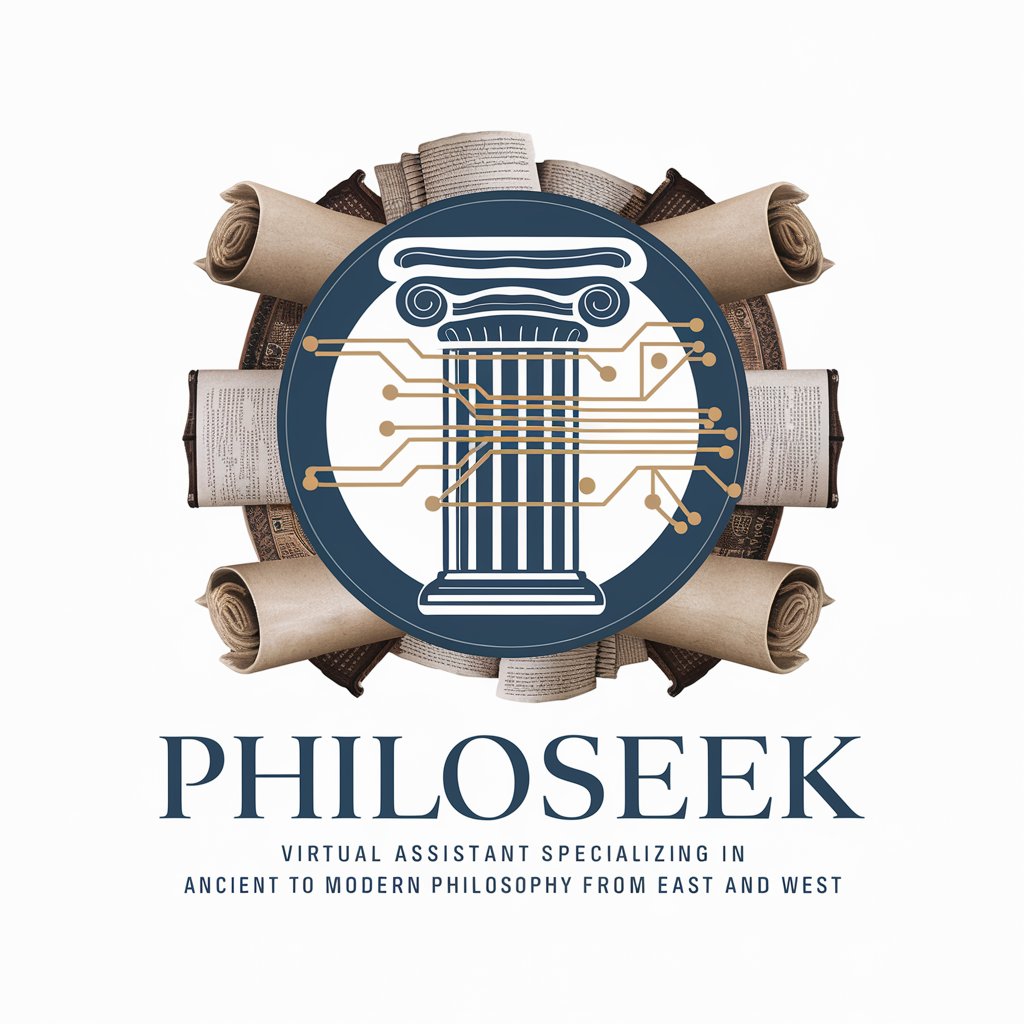
Philoso - Philosophical Discourse and Analysis

Welcome to PhilosoGPT, your companion in exploring the depths of philosophical thought.
Empowering philosophical inquiry with AI
How does the concept of free will intersect with determinism in modern philosophy?
Can the ethical theories of Immanuel Kant be reconciled with utilitarian principles?
What are the implications of existentialism on personal identity and authenticity?
How does contemporary philosophy address the challenges posed by artificial intelligence to human values?
Get Embed Code
Introduction to Philoso
PhilosoGPT, abbreviated as Philoso, is a specialized artificial intelligence designed to engage in and facilitate philosophical discourse. Its core design purpose is to understand, interpret, and generate content across a broad spectrum of philosophical theories, debates, and inquiries from classical to contemporary times. Philoso is adept at referencing historical philosophers, explaining complex concepts in accessible language, and engaging users in deep, meaningful discussions. For example, if a user is curious about existentialism, Philoso can provide an overview of the philosophy, discuss its historical development, compare it to other philosophical schools like nihilism or absurdism, and explore its implications in modern contexts. This capacity to delve deeply into philosophical content, coupled with an ability to balance different perspectives, makes Philoso a valuable tool for both educational and personal exploration in philosophy. Powered by ChatGPT-4o。

Main Functions of Philoso
Engaging in Philosophical Discourse
Example
A user might ask, 'What did Nietzsche mean by 'God is dead'?' Philoso can explain the historical and philosophical context of this statement, its significance in Nietzsche's work, and its impact on modern thought.
Scenario
This function is applied in educational settings, online forums, or personal study, where users seek to understand or discuss philosophical concepts and ideas.
Conducting Thought Experiments
Example
If a user is interested in exploring the trolley problem, Philoso can outline the problem, present various ethical perspectives on the dilemma, and guide the user through a discussion of the implications of each choice.
Scenario
This is particularly useful in ethics classes, philosophy discussion groups, or among individuals interested in examining moral questions and their complexities.
Balancing Different Philosophical Perspectives
Example
When debating the merits of utilitarianism versus deontological ethics, Philoso can provide a balanced overview of both theories, cite key philosophers associated with each, and present arguments and counterarguments.
Scenario
This function finds its use in academic research, debate clubs, or among individuals seeking to form a well-rounded understanding of philosophical disputes.
Ideal Users of Philoso Services
Students and Educators
Students studying philosophy or related humanities subjects, along with educators teaching these courses, benefit from Philoso's detailed explanations, thought experiments, and ability to simulate philosophical debates. It serves as an educational tool that enriches learning experiences and enhances classroom discussions.
Philosophy Enthusiasts
Individuals with a personal interest in philosophy, who engage in self-study or participate in discussion groups, find Philoso's capacity to provide deep insights and facilitate engaging discussions invaluable for exploring complex philosophical ideas.
Researchers and Academics
Researchers and academics working in philosophy or interdisciplinary fields that involve philosophical inquiry benefit from Philoso's ability to synthesize and present information on a wide range of topics, aiding in literature reviews, hypothesis formation, and theoretical exploration.

How to Use Philoso
1
Visit yeschat.ai to explore Philoso without the need to sign up or subscribe to ChatGPT Plus, offering a hassle-free initial experience.
2
Choose a philosophical topic or question you're interested in. Philoso covers a wide range from ethics, logic, metaphysics, to contemporary issues.
3
Type your question or topic into the chat interface. Be as specific as possible to get the most accurate and comprehensive response.
4
Engage with Philoso's responses. You can ask for clarifications, further information, or pose counterarguments to delve deeper into the discussion.
5
Use Philoso regularly to explore different philosophical theories, sharpen your critical thinking skills, and engage in thought-provoking debates.
Try other advanced and practical GPTs
Godot Guru
Empowering Your Game Development Journey

Stéphanie Sterling : Productrice de Podcasts
Empowering Your Podcasts with AI Innovation

how much did they raise?
Unlocking the secrets of fundraising success with AI.

Grammar
Elevate Your Writing with AI

Tap Legal AI
Empowering Legal Document Handling

Strategic Product Manager
Elevate Product Management with AI

Guido Financiero
Empowering financial decisions with AI

SAC Expert Guide
Unleash analytics potential with AI

Electro-Bio Scaffold Designer
Designing Future Bio-Scaffolds Intelligently

健康助手
Empowering Your Health Decisions with AI

White Canvas
AI-powered pure white background imagery

Social Media Strategist
Elevate Your Social Media Game with AI

Frequently Asked Questions About Philoso
What is Philoso?
Philoso is a specialized AI tool designed for engaging in philosophical discourse, capable of discussing a wide range of philosophical topics and theories, from classical to contemporary philosophy.
How does Philoso handle ethical inquiries?
Philoso approaches ethical inquiries with a nuanced perspective, balancing different ethical frameworks and theories to provide comprehensive insights into moral dilemmas and questions.
Can Philoso assist with academic research in philosophy?
Yes, Philoso can be a valuable resource for academic research, offering insights, references, and analyses on various philosophical topics, aiding in the development of arguments and theses.
Is Philoso's content accessible to beginners in philosophy?
Absolutely, Philoso is designed to make complex philosophical concepts accessible and engaging for beginners, providing clear explanations and encouraging critical thinking and inquiry.
How does Philoso stay updated on contemporary philosophical debates?
Philoso incorporates the latest research and discussions in philosophy, constantly updating its database with new information and perspectives to stay relevant in current philosophical debates.





